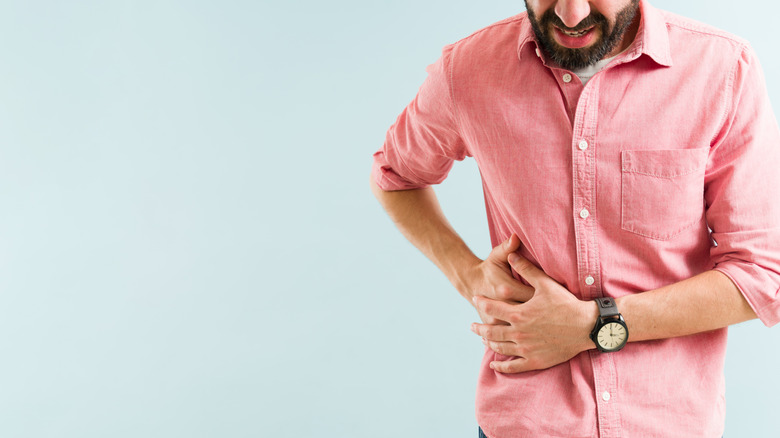How A Gallbladder Attack Is Treated
On average, most people probably don't give a whole lot of thought to their gallbladder, that tiny organ that sits below your liver on the right side of your abdomen (via Cleveland Clinic). The gallbladder is charged with the storage and release of bile, which is produced by your liver to aid in the breakdown of fat. If the gallbladder is functioning as it's supposed to, you shouldn't have any issues. However, if you experience a gallbladder attack, you will immediately be made aware of it.
A gallbladder attack can start when the components that make up bile, such as bilirubin and cholesterol, build up and form hardened deposits referred to as gallstones (via Medical News Today). According to a 2019 study in BMJ, many people who experience gallstones are asymptomatic. However, approximately 20% of gallstone cases cause pain and discomfort. BMJ reports that this pain is typically caused by the gallstones causing obstructions. It can last anywhere from a few minutes to hours.
Don't ignore gallbladder pain
According to Healthline, if you experience a gallbladder attack, particularly if you are having symptoms such as a fever, chills, or intense pain, you should see your doctor immediately. He or she will most likely give you medication to help deal with the immediate symptoms, such as pain medication and anti-nausea drugs. Your doctor may also run some tests, including an ultrasound or a CT scan to verify that what you're experiencing is in fact gallbladder-related.
In some cases, Cleveland Clinic notes, a surgical procedure called a cholecystectomy might be necessary. This involves the complete removal of the gallbladder, usually laparoscopically. Although you may have to make some alterations to your diet following the removal of your gallbladder, you can basically live a normal life without it.
The best way to prevent a gallbladder attack is to take the necessary steps to prevent gallstones from forming (via WebMD). This starts with a healthy diet without too much fat and a high amount of fiber. Raw fruits and vegetables, whole grains, and bran are all good ways to avoid the formation of gallbladder sludge and subsequent stones. You can also try some home remedies, such as milk thistle, which the National Center for Complementary and Integrative Health has suggested could help alleviate gallbladder problems. However, if you're experiencing gallbladder pain, you should see your doctor before undergoing any new diet regimen or trying any home remedies.


